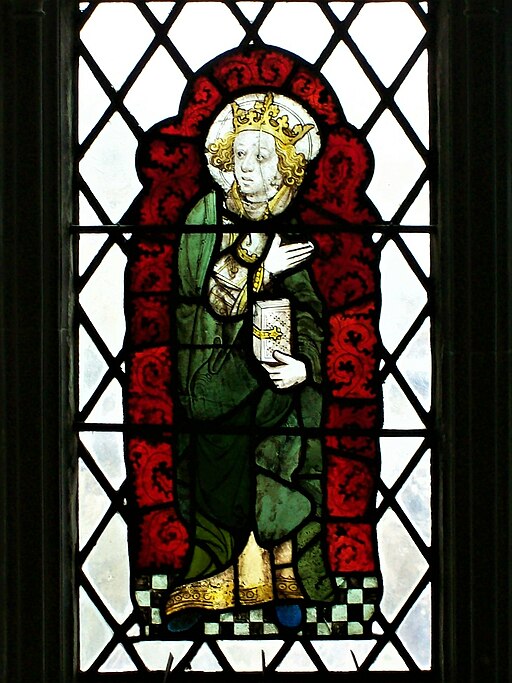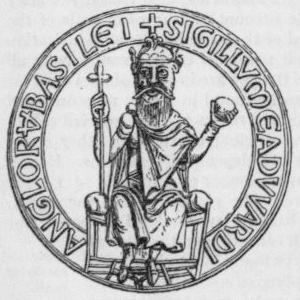Feast Day: January 5 (previously October 13)
Part of the fun of growing up in a cold climate was waking up on a random winter day, looking at a fresh blanket of white coating the roads, and realizing that I had been reprieved: snow day! Sure, I would have to make it up eventually, but the sudden surprise of freedom would delight my heart. That particular kind of surprise has happened less often as I’ve grown older, but does still happen. It’s how I met St. Edward the Confessor (a person whose way of life publicly “confesses” the depth of their faith). The University of Notre Dame traditionally celebrated “Founder’s Day” in honor of Fr. Edward Sorin on the old October feast day of his patron name saint, King Edward the Confessor. Over the years, the importance of that day for Notre Dame has faded (as has the practice of celebrating one’s “name day”—the feast of the saint one is named after); that year, at least, it had enough importance to one older member of the university community that I suddenly found my early morning obligations cancelled. I was free to walk around St. Mary’s Lake to relax and to reflect.
I knew little enough about St. Edward at the time. As I’ve learned more, I’ve come to appreciate his saintly reputation for patient endurance and care for the least of his subjects. There is beauty and strength in quiet leadership that refreshes others and gives them the space to become better.

The Life of Edward the Confessor
Being royal is by no means an automatic passport to an easy life. Edward was born a prince in Anglo-Saxon England in 1003. At the age of only ten, Edward had to flee England with his older brother in the face of Danish invaders. The two boys lived for years in exile in northern France. To add insult to injury, their mother stayed in England, married the invading Danish King Canute, and ended up supporting the royal claim of her new son with Canute over the claim of Edward and his brother. After Canute’s death, his northern empire fell apart. Edward’s brother died in a botched attempt to claim the crown too early, but eventually, at the age of forty, Edward managed to gain the throne of England despite his mother’s opposition.
Edward struggled to maintain his power as a king. He had gained the throne with the support of powerful nobles, particular the family of Earl Godwine, who felt that a king who owed his crown to them shouldn’t be able to boss them around. Edward married Godwine’s daughter Edith to cement the alliance but soon fell out with the powerful earl’s family. He spent several years separated from his wife. The couple failed to produce any children and the resulting lack of an heir would open England to the Norman invasion of 1066 after Edward’s death.
Traditionally historians have seen Edward’s reign as a failure. He failed to centralize power. He failed to lead his army in any grand conquests, although quick military interventions in Wales and Scotland helped stabilize his neighbors. He failed to produce a son.
Are those the criteria for judging a good king? When medieval biographers raised him up as a king to admire, they had rather different criteria. For them, reducing the power of the central government to tax its subjects was a good thing that improved life for the average person. Edward’s lack of money due to lesser taxes restrained the temptation for military adventures, but his preference for peace also likely came from faith and from mature reflection on his own childhood experience of war. His lack of an heir came, according to his biographers, from a religious commitment to purity and celibacy to which his wife agreed before consenting to their political marriage. Edward believed he could name an heir who would be a good ruler without preference for a mere blood tie. While Edward had to engage in the normal games of political power, his first love was always for God and for the poor. He used his throne and his personal wealth to care for both. That, for him, was success.

The Hands of a Healer
The final book of J.R.R. Tolkien’s The Lord of the Rings trilogy bears the title The Return of the King. In it, the people first recognize the drab warrior Aragorn as that titular king through an old woman’s folk proverb: “The hands of a king are the hands of a healer.” Her words inspire the wise wizard Gandalf to summon Aragorn to help several major characters stricken with a mysterious shadow. Aragorn heals them. Unlike Sauron, his foe who seeks to dominate the world through military might, Aragorn reveals himself as a true king by humbly helping others.
Tolkien almost certainly thought of Edward when he wrote this passage. Belief in the power of the “King’s Touch” to cure scrofula led to annual rituals in England and France which the ill poor came to the king to receive alms, food, and blessing from his hands being laid upon them. Tradition traces the miraculous King’s Touch to Edward, though the historical evidence is uncertain. Other earlier stories describe a man blessed by his care for the poor. One story has him carrying on his back a cripple to his new Westminister Abbey and setting him down a healed man. If these miracle stories are later creations, they describe a historical fact: Edward used his power in service of ordinary people. He gave them aid. He gave them peace for a time. He blessed the humble in his realm.
Leadership, Healing, and King Edward
I think we will be disappointed if we measure most political leaders by Tolkien’s standard of leadership: the hands of a healer. Some leaders who fail that test of being healers may be fighting for very good things, but what will they accomplish if their actions make the world hurt more in the end? Jesus, the ultimate king, prayed for forgiveness—spiritual healing—for his enemies even as they killed him (Lk 23:34). Reflecting on St. Edward draws me back to this aspect of Christ our King. Our King is fearless and powerful without losing that core of love that seeks to heal and transform others rather than beating them into submission. He raises us from fearful slaves to friends and companions (Jn 15:15).
In our political and economic systems—which award the top leadership positions to the highly competitive—such a servant leader may be rare. Honestly, I haven’t spent enough time with the political or corporate elite to know for sure. I do, however, know many leaders in small things who are healers. They generally do not seek out power but they step into that role when asked, including leadership. They may be department chairs, middle managers content with their positions, or volunteers in Scouting or other community organizations. They try to lift up those under them and comfort them when they are hurting. Their work is holy. It is not holy due to the power they have or even necessarily the type of work they do; it is holy because of how they approach their role as an opportunity to love the people entrusted to them.
St. Edward, pray for us that we may surprise those entrusted to us with love and healing. May we work truly for their good. May we never become attached to our own sense of power or importance. And may we express the gratitude in our hearts to those leaders who have touched us so they may be strengthened in what they do. Amen.
If you have a response, thoughts, or questions, please comment at the bottom of the page. Consider subscribing below to get email notifications about new reflections and other news.



2 Responses
[…] the North Sea in 1068. She had been born in exile to a member of the English royal family. When St. Edward the Confessor, her childless great-uncle, had reclaimed the English throne from the Danish invaders, he had […]
[…] my two previous posts, on Edward the Confessor and Margaret of Scotland, this is the story of troubled English royalty. Hilda lived in the 600s, […]